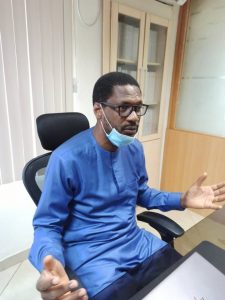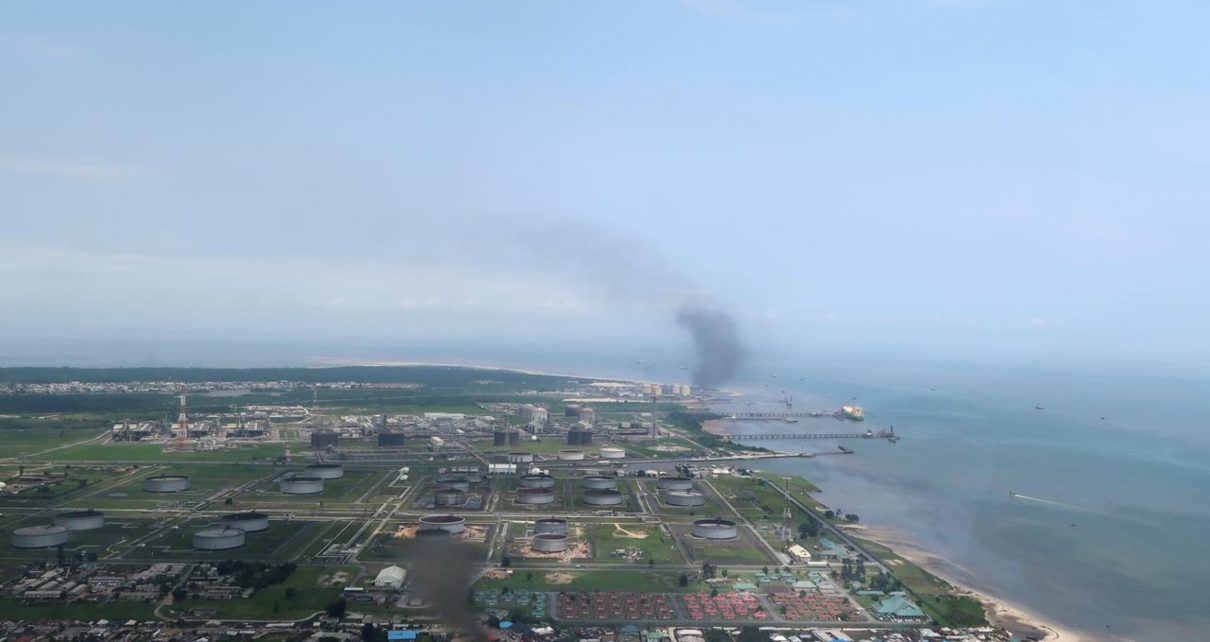Opeolu Babalola is the Managing Director of Webb Fontaine Nigeria, the company contracted by the Nigerian Customs Service to provide ICT solutions at the nation’s seaports. In this interview with a cross-section of journalists, he speaks on how ICT can change Nigeria’s maritime environment – YUSUF BABALOLA of Leadership Newspaper was there.
Give us an overview of Webb Fontaine’s operations in Nigeria?
Webb Fontaine was appointed by Nigeria Customs Service to implement a Customs-centric Single Window Portal and the provision of Information Technology and Telecom infrastructure for Nigeria.

This encompasses the delivery of Webb Fontaine’s Customs Webb, Customs Management Systems nationwide as the Nigerian Customs Integration Systems (NICIS II).
NICIS II has been adopted as a homegrown ICT Innovation for Nigeria Customs electronic platform. We have invested massively in capacity building through training and retraining of custom officers, some port users and other government employees.
So far, we have trained over 10,000 Nigerians on a total of13,479 sessions on various aspects of ICT aided trade procedures. Many of them are custom officers.
Specifically on ASYCUDA, we trained 2804 persons on NICIS I&II. We trained 10,260 on Database (ORACLE) 36 and on System Administration we have trained 30.
Our e-government software products, information and telecommunications technology and infrastructure services, peripherals and consumables, business process reengineering and standardisation has been applied successfully across various government agencies.
Our services synchronise well with the Federal government’s Ease of Doing Business and Trade Facilitation policies. We have always demonstrated commitment in helping government succeed in the drive to promote efficiency, time saving and transparency in the conduct of its businesses. We are doing all these because we are convinced that it is only through the effective use of ICT that we can win the war against corruption in Nigeria.
A lot of private sector operators have also found our support invaluable because of our culture of international best practices and promotion of legitimate way of doing things.
The COVID-19 Pandemic has had a very adverse effect on trade and logistics generally, how best do you think it should be managed in your area of operation?
Navigating the complex world of logistics, international ustoms and global supply chains in the post COVID-19 era will require government agencies and the private sector to embrace new methods that prioritise digitalisation.
We strongly recommend knowledge sharing and to streamline complicated and outdated processes for the benefit of all. Knowledge sharing will come with multiple benefits like increase in government revenue, support for trade and strengthening security in many ramifications.
As a good corporate citizen, we also supported the federal government in the battle to prevent and manage COVID-19 with donation of equipment.
Countries like Nepal, Guinea, Ethiopia, DR Congo, Benin, Maldives and other areas in Asia and Africa also benefited from our COVID -19 relief package.
On our own part, we also increased out knowledge-sharing efforts during the Pandemic. We brought a group of experts together to talk in a webinar.
We had in attendance Customs experts like Stephen Adekunle Oloyede, Comptroller Risk Management at the Nigeria Customs Service and Apeh Fateh, assistant Comptroller for ICT and head of the Implementation Team for the Nigeria Customs Service.
They explored new concepts to improve the industry by introducing greater efficiency through technology and the simplification of processes and checks.
Following on from the discussions we have created a report to continue the knowledge and ideas sharing. The White Paper examines how international best practices can be incorporated into all aspects of the sector, particularly in emergency situations and recommends possible routes of action in critical moments.
Nigeria Customs Service are already doing so much in the digital space including application of e-form M, their revenue has experienced appreciable increase. The NICIS II has been recognised as a credible digital trade platform by the World Trade Organisation and the World Customs Organisation. This led to them being able to adopt and be prepared for optimal operations even in the midst of the COVID-19 crisis.
Throughout COVID-19, the Customs Service maintained high revenue performance, which may not always have been the case for other government agencies. However, the total collections up to May this year are greater than last year’s total at the same time and NCS achieved well over 60 percent of the target.
The Nigeria Customs Service (NCS) generated N976.6 billion from January to August despite the COVID-19 Pandemic. Also and notably, the Customs IT platform operated robustly throughout the period of reduced movement.
NCS have really shone a light on just how important a digital led Customs approach is leading the way. With plans to get more automated as recently approved by the federal government.
Nigerians are not happy with the recent $3.1billion automation deal for customs as is being reported by the media. What is Webb Fontaine’s view on that?
We don’t know where those reports are coming from and have no part in them. I have read them and was surprised to see Webb Fontaine’s name prominently featured. We are investigating the source of the media reports. We won’t in any way support a narrative that shows tendencies to discourage modernisation progress or goes against the work of the Federal Government of Nigeria to enhance revenue collection and border security. From what I have seen, the huge amount is even to be brought in by the private sector.
We have no issues with Bionica or their plans and we have neither initiated nor asked to be joined in the lawsuit against them.
Let me say here that Webb Fontaine is fully supportive of all the federal government’s moves to continue and improve upon the modernisation and full automation of Nigeria Customs Service and its processes.
This will help to facilitate trade, increase revenue and enhance national security and will improve Nigeria’s standing in the World Bank’s Ease of Doing Business indices. This has been our focus and we have remained consistent with this over the years. (Leadership Newspaper)




